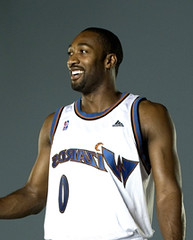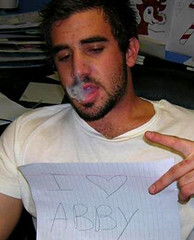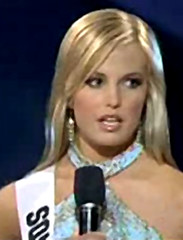 Every month, Brad Phillips, president of Phillips Media Relations, picks five video media disasters and highlights them at Mr. Media Training. I've read his blog before (worth subscribing to), but was new to his media disaster series.
Every month, Brad Phillips, president of Phillips Media Relations, picks five video media disasters and highlights them at Mr. Media Training. I've read his blog before (worth subscribing to), but was new to his media disaster series. It's a great concept. And yet, his five worst video media disasters (all of which are political) merit deeper discussion, at least for the month of August.
Here's a recap of his picks and some additional commentary on what he might have hit and missed. And, I've included a few suggestions that could easily have bumped out some of his other contenders.
Brad Phillips' Five Worst Video Media Disasters: August 2011
5. Christine O’Donnell Walks Off Piers Morgan
 Christine O’Donnell certainly deserved to be on the list. In fact, I had previously written some commentary about the walk off. While I agree with Phillips in his assessment that the interview was predictable and O’Donnell ought to have been more prepared, the entire event becomes a wash. Piers Morgan's line of questioning for every candidate has become boorish. And Phillips also missed the line of questioning that led up to the walk off. The sound bite that made the rounds was only part of the story.
Christine O’Donnell certainly deserved to be on the list. In fact, I had previously written some commentary about the walk off. While I agree with Phillips in his assessment that the interview was predictable and O’Donnell ought to have been more prepared, the entire event becomes a wash. Piers Morgan's line of questioning for every candidate has become boorish. And Phillips also missed the line of questioning that led up to the walk off. The sound bite that made the rounds was only part of the story.4. Charlie Rangel’s “Pretty Girl”
 I agree with Phillips, and would probably move this up. While Rep. Charles Rangel (D-NY) was growing frustrated with the interruptions from Laura Ingraham, sitting in for Bill O’Reilly, he crossed the line with a quip that she was a just a "pretty girl." Like O’Donnell, Rangel ought to have better prepared for the format. Even when O’Reilly is on, it's not uncommon for hosts and interviewees to talk over the guest. And, for the life of me, I can't think of a single reason to elevate a gender comment.
I agree with Phillips, and would probably move this up. While Rep. Charles Rangel (D-NY) was growing frustrated with the interruptions from Laura Ingraham, sitting in for Bill O’Reilly, he crossed the line with a quip that she was a just a "pretty girl." Like O’Donnell, Rangel ought to have better prepared for the format. Even when O’Reilly is on, it's not uncommon for hosts and interviewees to talk over the guest. And, for the life of me, I can't think of a single reason to elevate a gender comment.3. Mitt Romney: Corporations are People, My Friend
 There has been plenty of discussion over Mitt Romney's recent response to hecklers. When Romney mentioned he didn't want to raise taxes on people, someone yelled out "corporations." Romney addressed it by saying corporations are people (meaning: corporations employ people, fund 401ks and pensions, and aren't all big business). It wasn't well received. Phillips might be right to include it on the list, but only as a bonus. Romney can overcome the quip as long as he can craft a more palatable way to explain the truth behind it. He also has to understand why people feel that way: big corporate executive bonuses and largely abused tax incentives.
There has been plenty of discussion over Mitt Romney's recent response to hecklers. When Romney mentioned he didn't want to raise taxes on people, someone yelled out "corporations." Romney addressed it by saying corporations are people (meaning: corporations employ people, fund 401ks and pensions, and aren't all big business). It wasn't well received. Phillips might be right to include it on the list, but only as a bonus. Romney can overcome the quip as long as he can craft a more palatable way to explain the truth behind it. He also has to understand why people feel that way: big corporate executive bonuses and largely abused tax incentives. 2. Joe Biden Endorses China’s One Child Policy
 Most people know know that Vice President Joe Biden was sent abroad to placate China. It has led to several embarrassments, including one where journalists were literally forced out of a room before he had finished speaking. This off-script comment was another because Biden found common ground by comparing America's retirement challenges to those that China may face with their "one child" policy. This media moment is easily number one because it comes nowhere close to America's sentiment and further illustrates how agreeable this administration has become. Some things are better left unsaid.
Most people know know that Vice President Joe Biden was sent abroad to placate China. It has led to several embarrassments, including one where journalists were literally forced out of a room before he had finished speaking. This off-script comment was another because Biden found common ground by comparing America's retirement challenges to those that China may face with their "one child" policy. This media moment is easily number one because it comes nowhere close to America's sentiment and further illustrates how agreeable this administration has become. Some things are better left unsaid.1. Rick Perry Threatens a Public Official
 Rick Perry's remarks about Fed Chairman Ben Bernanke were largely blown out of proportion, especially given there are plenty of respected people who said the best service Bernanke could do for our country is to resign. Steve Forbes even said Bernanke must go. Most reasonable people also know that Perry was just talking tough and not necessarily calling for acts of violence or charges of treason. More than that, I disagree with Phillips that we have entered a post-Giffords world. On the contrary, listening to Rep. Andre Carson (D-Ind.) and others, including the president at times, such rhetoric is alive and well (sadly).
Rick Perry's remarks about Fed Chairman Ben Bernanke were largely blown out of proportion, especially given there are plenty of respected people who said the best service Bernanke could do for our country is to resign. Steve Forbes even said Bernanke must go. Most reasonable people also know that Perry was just talking tough and not necessarily calling for acts of violence or charges of treason. More than that, I disagree with Phillips that we have entered a post-Giffords world. On the contrary, listening to Rep. Andre Carson (D-Ind.) and others, including the president at times, such rhetoric is alive and well (sadly).Bonus. Al Sharpton Will Much About That Will Be Committed. Or Something.
Long story short, the bonus is amusing but hardly a worst media moment. While it might be worth a chuckle, Al Sharpton was obviously teleprompter tongue tied in the worst possible way. It's forgettable despite being funny. There were better picks.
For replacements, consider Al Gore's odd comparison of civil rights leaders and climate change proponents, especially because he prepared it. Look to Rep. Michele Bachmann (R-Minn.) for several more prepared gaffes, including one that suggested the Soviet Union was rising along with China and India. And last but not least, Rep. Andre Carson being the newest citizen vilifier to make headlines.
All in all, Phillips did a fine job. From my perspective, he was three for five as long as we swap some rankings and recognize Morgan as boorish. Those three also have the best lessons of the bunch too: prepare for the obvious questions, trying to discredit someone over gender only discredits you, and sacrificing pride is forgettable as long as you stand firm on values.





















